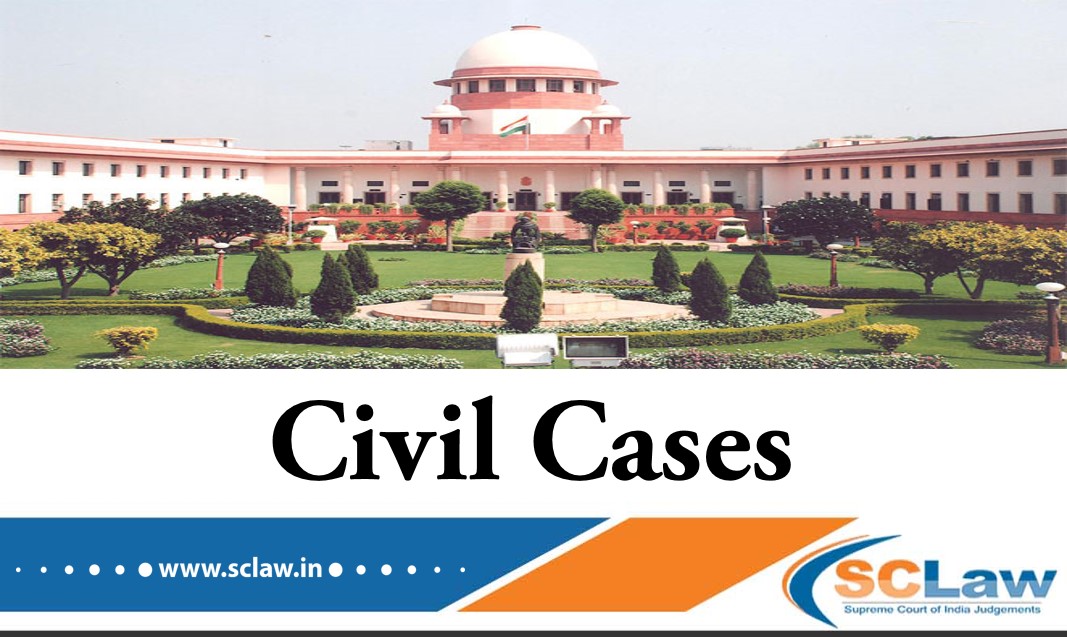Municipal Law-Disconnection of water between the private parties and they were unable to strike any settlement, cannot be a tangible reason to decline& electricity connection
(2017) 175 AIC 247 : (2017) 3 ALLMR 907 : (2017) 3 BCR 101 : (2017) 3 JT 178 : (2017) 2 LawHerald(SC) 1538 : (2017) 2 LawHerald(SC) 1155 : (2017) 4…
Land Acquisition Act, 1894, S.4 & 6–Quashing of Notification-Statutory Non- Compliance-Declaration u/s 6 was not made within statutory period
(2017) 175 AIC 268 : (2017) 124 ALR 520 : (2017) 2 ApexCourtJudgments(SC) 397 : (2017) 2 HLT 255 : (2017) 4 JT 390 : (2017) 2 LawHerald(SC) 1153 : (2017) 3 RCR(Civil) 188…
Modification of Decree—No Decree or Revision shall be reversed or varied substantially on account of non-joinder or misjoinder of parties.
(2017) 173 AIC 86 : (2017) AIR(SCW) 2002 : (2017) AIR(SC) 2002 : (2017) 122 ALR 508 : (2017) 4 AndhLD 81 : (2017) 2 ApexCourtJudgments(SC) 418 : (2017)…
Accident–Compensation–Interest rate of 9% fixed by High Court does not warrant any interference.
2008(1) LAW HERALD (SC) 673 IN THE SUPREME COURT OF INDIA Before The Hon’ble Mr. Justice Dr. Arijit Pasayat The Hon’ble Mr. Justice P. Sathasivam Civil Appeal No.682 of 2008…
Substantial Question of Law–Consideration of irrelevant fact and non-consideration of relevant fact would give rise to a substantial question of law Agreement to sell–Substantial Question of Law–Whether the plaintiff was ready and willing to perform its part of contract by itself may not give rise to a substantial question of law
2008(1) LAW HERALD (SC) 669 IN THE SUPREME COURT OF INDIA Before The Hon’ble Mr. Justice S.B. Sinha The Hon’ble Mr. Justice Harjit Singh Bedi Civil…
Electricity Meter–Replacement of existing meter with electronic meter-Section 20 of the Act confers power on the licensee to enter into the premises for the purpose of inspecting, testing, repairing or altering meter including replacement of meter instituted in the premises of the consumers.
2008(1) LAW HERALD (SC) 659 IN THE SUPREME COURT OF INDIA Before The Hon’ble Mr. Justice S.B. Sinha The Hon’ble Mr. Justice Harjit Singh Bedi Civil Appeal No. 4789 of…
Voluntary Retirement Scheme–Once an employee retired under the VRS and paid accordingly–Such employee cannot claim the benefits of subsequent settlement arrived between management and workmen.
2008(1) LAW HERALD (SC) 655 IN THE SUPREME COURT OF INDIA Before The Hon’ble Mr. Justice Arijit Pasayat The Hon’ble Mr. Justice P. Sathasivam Civil Appeal No. 5787 of 2000…
Forged Document– Naturally a direction for filing of a complaint in not made during pendency of proceeding before the court and this is done at the stage when proceeding is concluded and final judgment is rendered.
2008(1) LAW HERALD (SC) 650 IN THE SUPREME COURT OF INDIA Before The Hon’ble Mr. Justice Dr. Arijit Pasayat The Hon’ble Mr. Justice P. Sathasivam Appeal (civil) 564 of 2002 …
Amendment of plaint –Refusal to permit amendment would create needless complication at the stage of execution, thus amendment allowed.
2008(1) LAW HERALD (SC) 646 IN THE SUPREME COURT OF INDIA Before The Hon’ble Mr. Justice G.P. Mathur The Hon’ble Mr. Justice Aftab Alam Civil Appeal No. 481 of 2008…
Promotion–Order of Minister disapproving his case not challenged–No interference with the order denying the promotion by DPC is called for.
2008(1) LAW HERALD (SC) 644 IN THE SUPREME COURT OF INDIA Before The Hon’ble Mr. Justice Arijit Pasayat The Hon’ble Mr. Justice Tarun Chatterjee The Hon’ble Mr. Justice Lokeshwar Singh…













